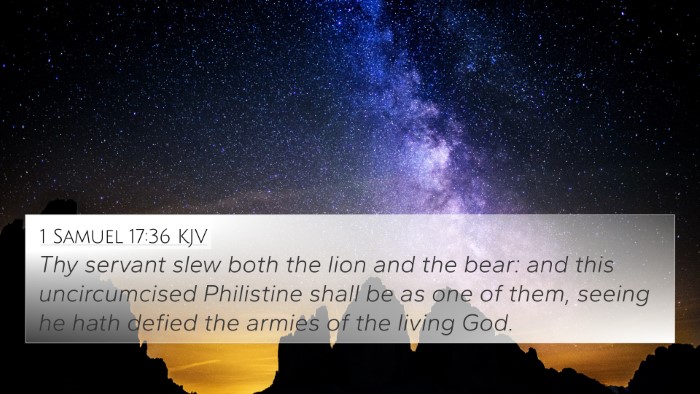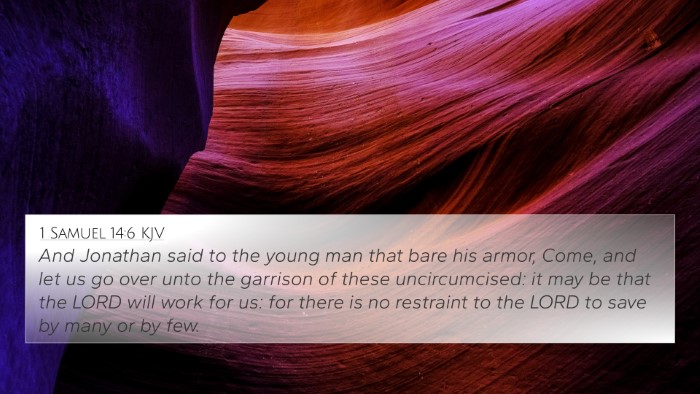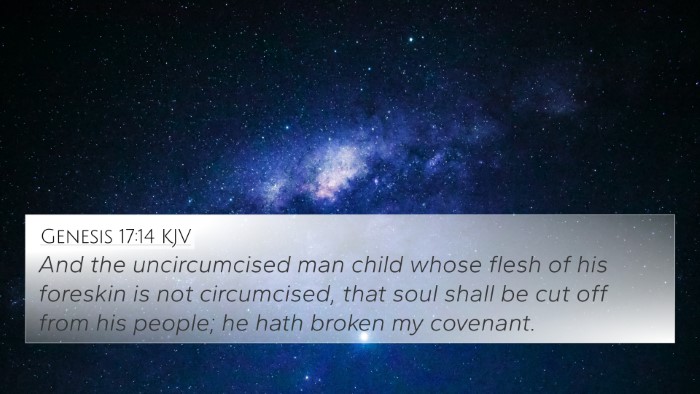Understanding Genesis 34:14
Genesis 34:14 presents a scenario where the sons of Jacob confront the men of Shechem regarding the seduction of their sister Dinah. This verse deals with themes of honor, justice, and the consequences of sin. In analyzing this text, we can draw insights from various public domain commentaries, providing an enriched understanding of its implications and connections.
Verse Context
Before delving into the verse's meaning, it's essential to understand its context. Dinah, the daughter of Jacob and Leah, was violated by Shechem, the son of Hamor the Hivite. The narrative highlights the initial feelings of anger and duty to protect family honor, which will lead to severe consequences.
Commentary Insights
Matthew Henry's Commentary
According to Matthew Henry, this verse reflects the deep-seated issues of cultural and moral conflict. He points out that the act of Shechem was not an isolated event but a significant moral transgression that required a strong response from Dinah's brothers. Henry emphasizes the importance of familial honor and the lengths to which Jacob’s sons would go to restore it.
Albert Barnes' Commentary
Albert Barnes highlights the deceptive nature of the Shechemites' proposal and draws attention to the manner in which they exploited Dinah’s situation. Barnes notes that the conditional acceptance of Shechem’s terms by Dinah's brothers reveals their tactical mindset, revealing they were not merely seeking justice but also a means to enact their vengeance.
Adam Clarke's Commentary
Adam Clarke elaborates on the brothers' response, indicating their intent behind agreeing to Shechem's proposition. He portrays the brothers as shrewd and calculating, discussing their subsequent actions as part of a larger scheme to take vengeance against Shechem and the Hivites. Clarke's analysis focuses on their motivations and the implications of such brutal justice.
Thematic Connections
This verse can be connected to broader biblical themes, such as justice, retribution, and the protection of family honor. The implications of this act reverberate through subsequent narratives in Genesis and beyond, showcasing the longstanding consequences of sin within a community.
Cross-References
- Genesis 34:2 - The act of Shechem violating Dinah.
- Deuteronomy 22:24 - The law regarding a seduced girl and the punishment for such acts.
- Exodus 22:16-17 - The instructions regarding seduction and marriage responsibilities.
- Joshua 24:32 - The mention of Jacob’s family and their sojourn in Shechem.
- Genesis 49:5-7 - Jacob’s prophecy regarding Simeon and Levi's violent actions.
- Hosea 6:7 - A reference to the faithlessness of Israel, connecting back to the actions of the patriarchs.
- Matthew 18:6 - An insight into the consequences of leading others into sin, paralleling the seduction of Dinah.
- Galatians 6:7 - The principle of sowing and reaping, illustrating the repercussions of their actions.
- 2 Samuel 13:14 - The narrative of Amnon and Tamar, highlighting themes of family violence and betrayal.
- John 8:44 - Jesus speaks about sin and its consequences, offering a moral evaluation similar to that in Genesis.
Conclusion
Genesis 34:14 serves as a critical juncture in the narrative of Jacob’s family. Through the interpretations of esteemed commentators, we see a confluence of themes regarding justice, sin, and the complexity of human relationships. By studying these connections between Bible verses, one garners a deeper understanding of God's unfolding narrative and divine justice. Utilizing tools such as a Bible concordance or a Bible cross-reference guide can enhance one's study, allowing for a richer analysis of the interconnectedness of Scripture.
Further Study
For those interested in further exploring how Bible verses interconnect, various resources like Bible chain references and comprehensive cross-reference materials can provide insightful frameworks for study. Investigating links between verses not only illuminates the text itself but also enriches the reader’s spiritual journey and understanding of scripture.















